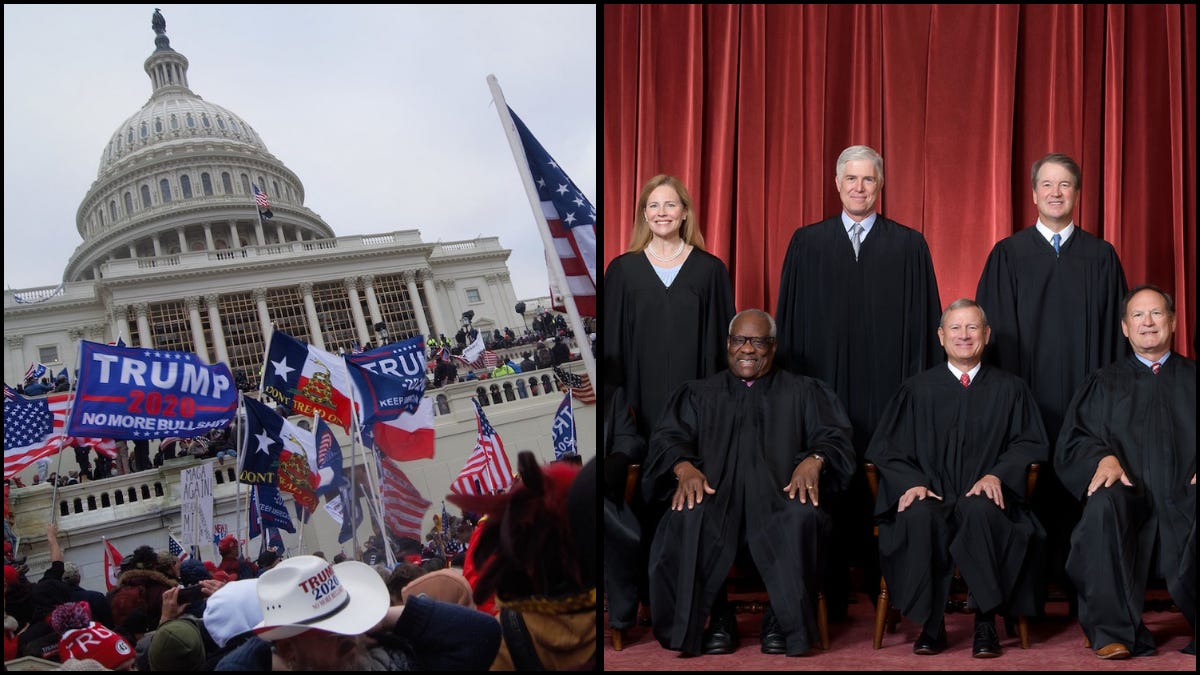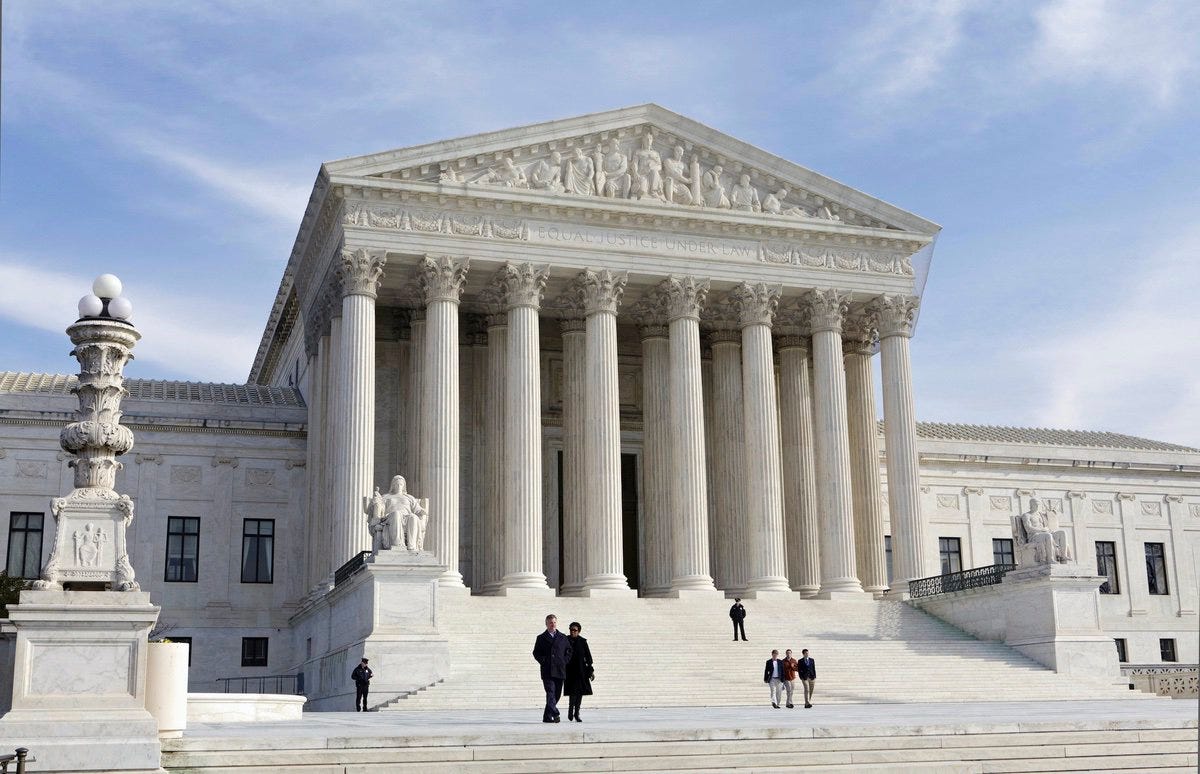Americans Deserve The Jan. 6 Trial Verdict Before Election Day
The Supreme Court's decision to hear Trump's presidential immunity case has granted him delays that could prevent the trial from concluding until after Election Day. Voters deserve better.

Thank you for reading! With media layoffs rattling the industry and the 2024 election looming, support for journalism has never been more crucial. If you value in-depth, honest analysis, consider becoming a free or paid subscriber to my newsletter. My content isn’t paywalled, but paid subscribers empower this work and gain access to exclusive community features. Your subscription makes a difference.
Whether or not Trump will face accountability for his assault on American democracy before the presidential election was just thrown into uncertainty.
On Wednesday at 5 pm EST, the Supreme Court granted cert for Trump’s presidential immunity appeal, agreeing to hear the case starting the week of April 22. The justices also granted a stay of the lower appellate court’s immunity ruling, pausing all proceedings in the January 6 trial pending the high court’s decision.
April 22 will be a full 133 days after Special Counsel Jack Smith’s December 11 request for the Supreme Court to hear the case on an expedited basis.
By simply agreeing to take up the case, the 6-3 conservative Supreme Court enabled Donald Trump’s favorite legal tactic: delay.
Trump is hoping the federal January 6 trial can be delayed until after the election. He knows the facts of his multifaceted effort to overturn the 2020 election are so damning they will deeply damage his 2024 campaign. The airtight nature of the case makes a conviction and potential jail time likely.
Trump’s plan is to win re-election, end the federal prosecutions he faces, and then seek retribution against all of those who sought to hold him accountable. That’s not my personal speculation. Saving himself from accountability and exacting revenge is the explicit purpose of his campaign.
Trump pursued this Supreme Court delay by appealing the ruling from the US Court of Appeals for the DC Circuit. Last month, the bipartisan three-judge panel ruled, in no uncertain terms, that Trump is not above the law. I wrote an analysis piece on the robust and incisive 57-page decision. The ruling was well-written, ironclad in its arguments, and tailor-made for an imminent Supreme Court review.
It picked apart Trump’s legal defenses one by one. It eviscerated Trump’s claims of absolute immunity as antithetical to the vision of the Founding Fathers and a stance that would “collapse our system of separated powers by placing the President beyond the reach of all three Branches.”
“This is not a difficult legal question,” Rep. Jamie Raskin (D-MD) told The New Republic Staff Writer Greg Sargent about the merits of the immunity case. “All the Supreme Court has done is introduce several months of gratuitous delay right before the presidential election,” Raskin accurately asserted.
The Supreme Court didn’t have to hear the case and grant a stay on the appellate ruling. In fact, they could’ve simply let the appellate court’s ruling stand and let the trial continue. Instead, they opted to take up the case and grant an unnecessary stay on the trial proceedings.
The trial was originally set for March 4 by U.S. District Judge Tanya Chutkan. Then Trump filed this presidential immunity claim in an effort to throw out the charges. Judge Chutkan rejected the claim, leading to Trump’s appeal of the ruling. Trump successfully used the tools of the judiciary system against itself to delay and possibly circumvent justice.
Let’s dive into how this delay could play out and the impact it will have on the January 6 trial schedule.
How Does This Supreme Court Delay Impact The Trial Timeline?

Before the proceedings were paused in December, Trump’s legal team had 88 days left for prep time ahead of the previously scheduled March 4 trial. That prep time was stalled. So, let’s say, in the best-case scenario, the Supreme Court ruled very quickly the same week they start hearing the case, which is April 22. If that 88-day prep time were to still be allotted, then jury selection couldn’t start until July.
Special Counsel Jack Smith has said he would only need 4 to 6 weeks to present his case, but potential jurors have been told that the trial could take up to be 3 months after jury selection is completed.
Under that scenario, the earliest the trial could end is October. But that is in the case the Supreme Court rules Trump is not immune, and that they rule immediately.
Former US Attorney Andrew Weissmann discussed this possibility on MSNBC, claiming the Supreme Court’s decision to take up the case could move the trial “perilously close to the election” in the best-case scenario. In another scenario, the Supreme Court drags its feet on a decision and the trial won’t end until after the election.
There are multiple views on the potential timelines. Former acting U.S. Solicitor General Neal Katyal told MSNBC’s Alex Wagner that he’s “gravely concerned” for the rule of law after the Supreme Court’s decision. But he didn’t rule out the possibility that Judge Chutkan could decide to reduce the prep time given these new delays.
USA TODAY covered a more rosy outlook on a potential Jan. 6 pre-election trial:
Two legal experts who were involved in congressional efforts to impeach Trump also issued a statement about the federal trial’s prognosis as part of a Defend Democracy Project effort.
“Our experts believe there is still a good chance that Trump faces a trial in this case this year,” said Norm Eisen, former special counsel to the House Judiciary Committee and Tom Joscelyn, principal author of the final report by the House Jan. 6 committee investigating Trump. “As shocking as it was, yesterday’s (Supreme Court) decision was not the end of the January 6 election interference case.”
We’ll see how this plays out, but the delay itself is a problem
Americans Deserve Better
Former Congresswoman and former Vice-Chair of the January 6 Committee, Liz Cheney, powerfully called out the delay in a post on Twitter/X:
“Delaying the January 6 trial suppresses critical evidence that Americans deserve to hear. Donald Trump attempted to overturn an election and seize power. Our justice system must be able to bring him to trial before the next election. SCOTUS should decide this case promptly.”
Liz Cheney is right. Americans deserve to hear the evidence Special Counsel Jack Smith presents. The evidence depicts a multifaceted criminal conspiracy to overturn the 2020 election from multiple fronts. It goes far beyond January 6. Jack Smith’s indictment makes that clear.
I wrote an analysis piece on the indictment with the Independent the night Smith released the charging document. The charges go to the heart of our democracy. Trump faces four counts: Conspiracy to Defraud the United States; Conspiracy to Obstruct an Official Proceeding; Obstruction of and Attempt to Obstruct an Official Proceeding; and Conspiracy Against Rights.
Based on the evidence we’ve seen in the January 6 Committee hearings and the allegations outlined in both Smith’s indictment and Fulton County DA Fani Willis’s indictment, Trump’s conduct was incredibly corrupt. Trump was complicit in the fake elector plot, the pressure campaign targeting former Vice President Mike Pence, the efforts to coerce state officials to overturn legitimate election results, and the pressure placed on the DOJ to participate in the plot.
The American people deserve to know the outcome of a trial where the former president is accused of crimes against the democracy he’s once again seeking to lead. They deserve to see the trial play out in full, outlining all the facts of the case. And most of all, they deserve a verdict from a jury of Trump’s peers, not from unelected justices appointed by him.
For those of us who obsessively watched the January 6 Committee hearings and have followed the details of this case, it’s pretty clear to us that Donald Trump not only acted in a depraved, authoritarian manner but that he also broke the law. But Americans who haven’t followed as closely will need a conviction for the gravity of these crimes to settle in.
Americans do care about this. The data bears this out.
A recent CNN poll found that a majority of Americans want a verdict in the January 6 case before ballots are cast in the 2024 presidential election. Exit polls in Iowa, New Hampshire, and South Carolina all found that over 30% of Republican primary voters say Trump would be unfit for President if he’s convicted.
In November, a New York Times/Siena College poll found if Trump were to be convicted and sentenced, Biden would take the lead in all six battleground states and, in some cases, win by double digits.
The data depicts a stark reality: The timing of the January 6 trial will have a direct impact on the outcome of the election. Trump faces several other cases, but it’s clear this one will have the greatest impact.
One could argue that the Supreme Court’s decision to hear this election interference case, and the delays it has already caused, is a form of election interference within itself.
Let’s hope they rule on this case as quickly as possible so the January 6 trial can conclude before November 5. We deserve at least that.





